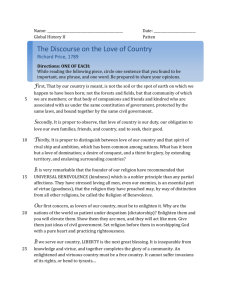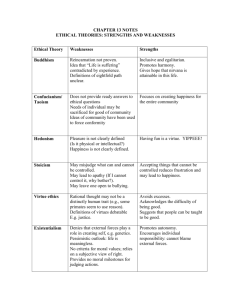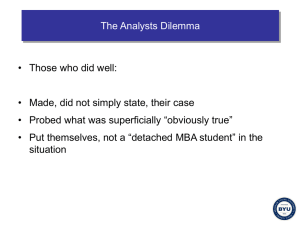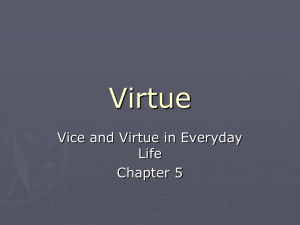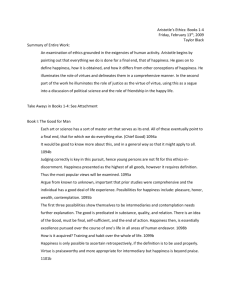Document 11246299
advertisement
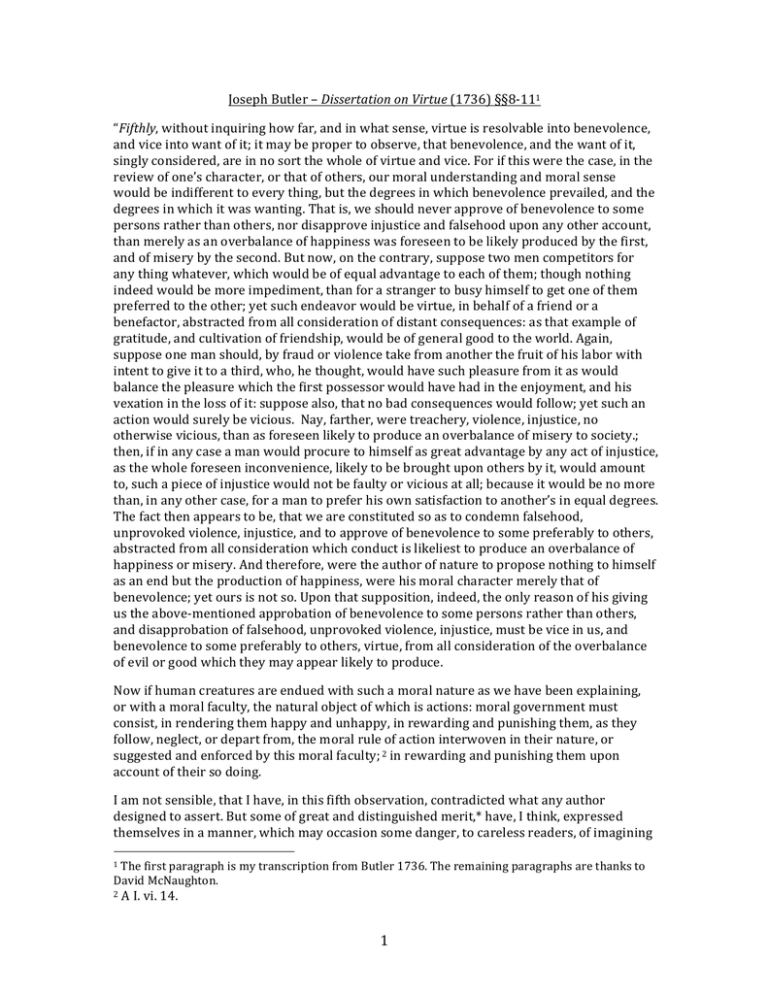
Joseph Butler – Dissertation on Virtue (1736) §§8-­‐111 “Fifthly, without inquiring how far, and in what sense, virtue is resolvable into benevolence, and vice into want of it; it may be proper to observe, that benevolence, and the want of it, singly considered, are in no sort the whole of virtue and vice. For if this were the case, in the review of one’s character, or that of others, our moral understanding and moral sense would be indifferent to every thing, but the degrees in which benevolence prevailed, and the degrees in which it was wanting. That is, we should never approve of benevolence to some persons rather than others, nor disapprove injustice and falsehood upon any other account, than merely as an overbalance of happiness was foreseen to be likely produced by the first, and of misery by the second. But now, on the contrary, suppose two men competitors for any thing whatever, which would be of equal advantage to each of them; though nothing indeed would be more impediment, than for a stranger to busy himself to get one of them preferred to the other; yet such endeavor would be virtue, in behalf of a friend or a benefactor, abstracted from all consideration of distant consequences: as that example of gratitude, and cultivation of friendship, would be of general good to the world. Again, suppose one man should, by fraud or violence take from another the fruit of his labor with intent to give it to a third, who, he thought, would have such pleasure from it as would balance the pleasure which the first possessor would have had in the enjoyment, and his vexation in the loss of it: suppose also, that no bad consequences would follow; yet such an action would surely be vicious. Nay, farther, were treachery, violence, injustice, no otherwise vicious, than as foreseen likely to produce an overbalance of misery to society.; then, if in any case a man would procure to himself as great advantage by any act of injustice, as the whole foreseen inconvenience, likely to be brought upon others by it, would amount to, such a piece of injustice would not be faulty or vicious at all; because it would be no more than, in any other case, for a man to prefer his own satisfaction to another’s in equal degrees. The fact then appears to be, that we are constituted so as to condemn falsehood, unprovoked violence, injustice, and to approve of benevolence to some preferably to others, abstracted from all consideration which conduct is likeliest to produce an overbalance of happiness or misery. And therefore, were the author of nature to propose nothing to himself as an end but the production of happiness, were his moral character merely that of benevolence; yet ours is not so. Upon that supposition, indeed, the only reason of his giving us the above-­‐mentioned approbation of benevolence to some persons rather than others, and disapprobation of falsehood, unprovoked violence, injustice, must be vice in us, and benevolence to some preferably to others, virtue, from all consideration of the overbalance of evil or good which they may appear likely to produce. Now if human creatures are endued with such a moral nature as we have been explaining, or with a moral faculty, the natural object of which is actions: moral government must consist, in rendering them happy and unhappy, in rewarding and punishing them, as they follow, neglect, or depart from, the moral rule of action interwoven in their nature, or suggested and enforced by this moral faculty; 2 in rewarding and punishing them upon account of their so doing. I am not sensible, that I have, in this fifth observation, contradicted what any author designed to assert. But some of great and distinguished merit,* have, I think, expressed themselves in a manner, which may occasion some danger, to careless readers, of imagining 1 The first paragraph is my transcription from Butler 1736. The remaining paragraphs are thanks to David McNaughton. 2 A I. vi. 14. 1 the whole of virtue to consist in singly aiming, according to the best of their judgment, at promoting the happiness of mankind in the present state; and the whole of vice, in doing what they foresee, or might foresee, is likely to produce an overbalance of unhappiness in it: than which mistakes, none can be conceived more terrible. For it is certain, that some of the most shocking instances of injustice, adultery, murder, perjury, and even of persecution, may, in many supposable cases, not have the appearance of being likely to produce an overbalance of misery in the present state; perhaps sometimes may have the contrary appearance. For this reflection might easily be carried on, but I forbear — the happiness of the world is the concern of him, who is the Lord and the Proprietor of it: nor do we know what we are about, when we endeavour to promote the good of mankind in any ways, but those which he has directed; that is indeed in all ways, not contrary to veracity and justice. I speak thus upon supposition of persons really endeavouring, in some sort, to do good without regard to these. But the truth seems to be, that such supposed endeavours proceed, almost always, from ambition, the spirit of party, or some indirect principle, concealed perhaps in great measure from persons themselves. And though it is our business and our duty to endeavour, within the bounds of veracity and justice, to contribute to the ease, convenience, and even cheerfulness and diversion of our fellow-­‐creatures: yet from our short views, it is greatly uncertain, whether this endeavour will in particular instances, produce an overbalance of happiness upon the whole; since so many and distant things must come into the account. And that which makes it our duty, is, that there is some appearance that it will, and no positive appearance sufficient to balance this, on the contrary side; and also, that such benevolent endeavour is a cultivation of that most excellent of all virtuous principles, the active principle of benevolence. However, though veracity, as well as justice, is to be our rule of life; it must be added, otherwise a snare will be laid in the way of some plain men, that the use of common forms of speech generally understood, cannot be falsehood; and, in general, that there can be no designed falsehood without designing to deceive. It must likewise be observed, that in numberless cases, a man may be under the strictest obligations to what he foresees will deceive, without his intending it. For it is impossible not to foresee, that the words and actions of men in different ranks and employments, and of different educations, will perpetually be mistaken by each other: and it cannot but be so, whilst they will judge with the utmost carelessness, as they daily do, of what they are not, perhaps, enough informed to be competent judges of, even though they considered it with great attention. 2
